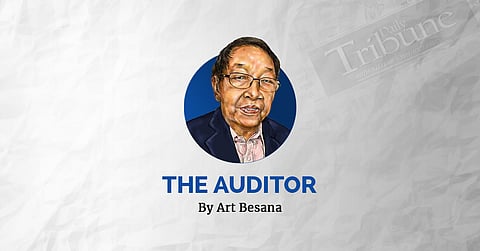
- NEWS
- the EDIT
- COMMENTARY
- BUSINESS
- LIFE
- SHOW
- ACTION
- GLOBAL GOALS
- SNAPS
- DYARYO TIRADA
- MORE

The New York Supreme Court approved last Thursday, 29 February, the case filed by Bangladesh Bank against RCBC on the causes of action, including the return of the stolen $81 million.
Keen political observers opined that “TG” Guingona lost in the 2016 Senate election because of his advocacy against dirty money.
Then Congressman Teofisto “TG” Guingona III knew I had no pension. He took me in as a staff member during his term as representative of the second district of Bukidnon.
He is an advocate of full disclosure for a just and fair judgment.
The decision of the New York Supreme Court allowing the case filed by Bank of Bangladesh against the Rizal Commercial Banking Corporation, or RCBC, and the other defendants over the $81-million cyberheist in 2016 to proceed on the other causes of action, including the return of the money, must have been born out of Guingona’s advocacy that caused his defeat.
The following constituted his most important but costly advocacy:
Guingona said the flow of dirty money through Philippine banks and casinos could be stopped if the government added exemptions to the bank secrecy law and gave the Anti-Money Laundering Council, or AMLC, the power to freeze accounts and monitor suspicious casino transactions directly.
He issued this statement as chairman of the Senate Blue Ribbon Committee investigating the $81-million Bangladesh Bank heist.
“It’s clear that when the money entered the Philippines, there was a paper trail. It was traceable, but once it entered the casinos, there was a black hole,” Guingona said. “It was like a cave, totally dark; you could not trace it anymore.”
According to Guingona, there are three steps to prevent the country from being involved in cross-border electronic fraud and money laundering schemes.
These steps are: to place the casinos under the jurisdiction of the AMLC; to give the AMLC the power to issue cease and desist orders; and to add exceptions to the bank secrecy laws.
“We need legislation to include casinos so that the AMLC would have the legal obligations and duty to report these transactions,” Guingona had said.
“The law, which was first introduced in 2001, left casinos out of the list of entities required to report suspicious transactions to the AMLC. There were efforts in the Senate by some lawmakers and Pagcor to exempt casinos from tougher anti-money laundering laws.”
On 6 February 2013, casino and internet gaming were excluded from the anti-money laundering law at the request of the House and Pagcor, Senator TG Guingona said.
“We have to look at the bank secrecy laws again. This law was passed a long time ago when computers were not yet invented, but the laws are still there,” Guingona said.
“The basic principle is that bank deposits are secret, then there are exceptions, and see if these are enough with the changing needs of the time,” the then-senator said.
Guingona said if there was a criminal case, the government should lift the right to secrecy.
He said that nothing much came out during the hearing as most invoked the bank secrecy law.
Guingona said the government should provide AMLC with the power to issue cease and desist orders, which could be an effective stopgap measure.
In the Bangladesh bank heist case, AMLC got a freeze order only on 1 March after the Bangladesh bank sent a request for a “stop payment order” to RCBC on 8 February, asking the local bank to refund or freeze the stolen funds. But AMLC got the freeze order on 1 March, many days after securing a reply from the Office of the Solicitor General.
